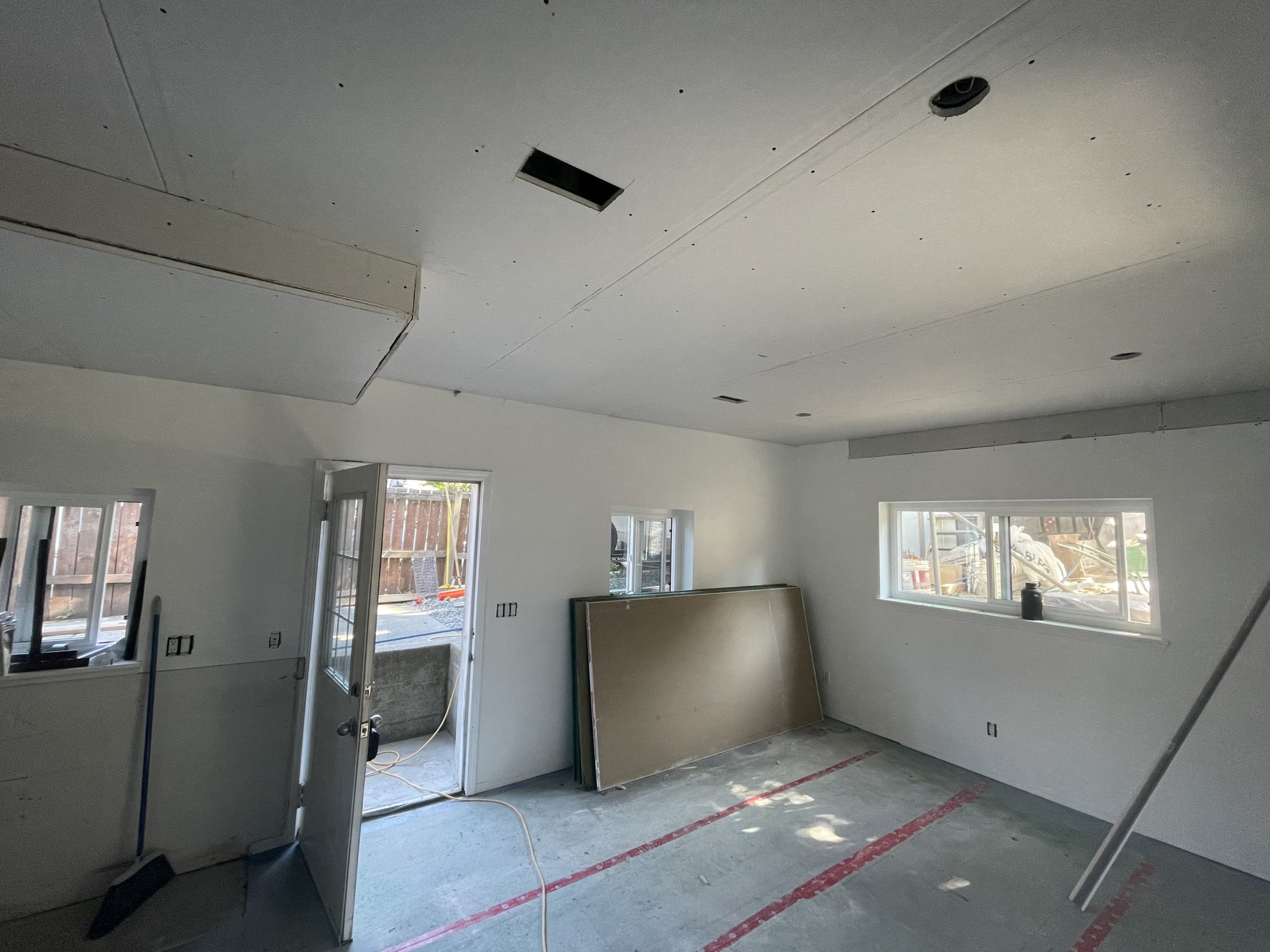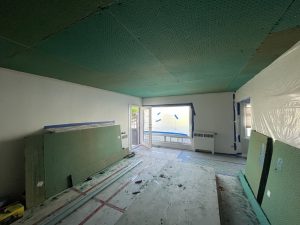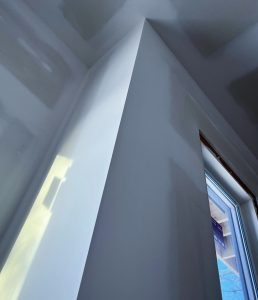Choosing the right contractor for drywall installation is crucial to ensuring a successful and hassle-free project. Here are some best practices to consider when selecting a contractor for your drywall installation:
1. Research and Gather Recommendations:
The process of selecting a contractor for drywall installation begins with research. To find the right professional, consider seeking recommendations from friends, family, neighbors, or coworkers. Personal referrals are often valuable because they come from people you trust. They can provide firsthand insights into a contractor’s work, professionalism, and reliability. Additionally, you can explore online platforms, review websites, and social media to discover local contractors and read customer reviews. While online reviews can be helpful, always approach them with some skepticism, as not all reviews are genuine or accurate.
2. Verify Credentials and Licensing:
Before you proceed, it’s essential to ensure that the contractor you’re considering is legitimate and properly licensed. Licensing requirements can vary depending on your location, so it’s crucial to check with your local authorities to understand the specific licensing requirements for contractors in your area. Licensing typically signifies that the contractor has met certain standards and requirements to operate in your jurisdiction. Additionally, check whether the contractor carries liability insurance. This insurance protects you and your property in the event of accidents or damage caused during the project.
3. Check Experience and Expertise:
The next step in your selection process is to assess the contractor’s experience and expertise. Consider how long they have been in the drywall installation business and whether they have a track record of successfully completed projects. Request information on their previous projects, such as residential or commercial work, and ask for references. Talking to past clients can give you a clearer picture of the contractor’s work quality, reliability, and professionalism. If possible, visit completed projects in person to assess the quality of their workmanship.
4. Get Multiple Bids:
It’s wise to obtain multiple bids from different contractors. Receiving at least three written estimates allows you to compare prices, the scope of work proposed, and the terms and conditions of each contractor. Comparing these bids can help you identify competitive pricing and gain insight into the various options available to you. Keep in mind that the lowest bid may not always be the best choice, as quality and reputation should also factor into your decision.
As you assess potential contractors, ask to see samples of their previous work, such as before-and-after photos or a portfolio of completed projects. Examining these examples will provide you with a sense of the contractor’s work quality and style. You may find that some contractors specialize in specific design aesthetics or project types, so reviewing their portfolios can help you determine whether their style aligns with your vision for the project. If the opportunity arises, visit the actual projects to see the quality of their work in person, which can be especially beneficial when assessing the finishing and attention to detail.
6. Discuss Materials and Techniques:
To ensure that your drywall installation meets your expectations, have a detailed conversation with potential contractors about the materials and techniques they intend to use. Inquire about the type and thickness of drywall materials they plan to install, as well as the specific brands they recommend. Additionally, discuss the installation techniques they will employ, including taping, mudding, and finishing. Clear communication at this stage will help you understand the materials that will be used and the expected quality of the finished product.
7. Check References:
Contact the references provided by the contractor to gain valuable insights into their performance, professionalism, and overall quality of their work. When speaking with references, consider asking about the following:
- Were they satisfied with the work done?
- Did the contractor adhere to the project timeline and budget?
- Were there any unexpected issues or changes, and how did the contractor handle them?
- Did they encounter any problems during or after the project, and were these issues resolved satisfactorily?
Speaking directly with past clients can provide a deeper understanding of a contractor’s strengths and any potential shortcomings.
8. Understand the Timeline:
Discuss the expected timeline for the drywall installation project with the contractors. Clearly defined project timelines are essential to ensure that the work aligns with your schedule and expectations. Delays can be inconvenient and may result in additional costs, so it’s crucial to have an agreed-upon start date and completion date in writing. Be prepared to discuss potential factors that could affect the timeline, such as weather conditions for exterior installations or the availability of materials.
9. Communicate Clearly:
Effective communication is fundamental to a successful drywall installation project. The contractor you choose should be responsive and attentive to your needs and concerns. During the selection process, assess their communication skills. Do they respond promptly to your inquiries? Do they listen to your ideas and concerns? Are they willing to discuss any special requirements or changes to the project? A contractor who communicates openly and transparently is more likely to deliver the results you desire.
Once you’ve identified the contractor you want to work with, it’s essential to have a written contract that outlines all the project details. The contract should include the following:
- A detailed scope of work, including the specific tasks to be completed.
- The project timeline, including start and completion dates.
- Payment terms and a payment schedule, specifying the percentage to be paid at different project milestones.
- The agreed-upon materials, including the type, brand, and any special requirements.
- Any warranties or guarantees offered by the contractor, including information on how to address potential issues or disputes.
- A clause outlining how disputes or conflicts will be resolved, such as through mediation or arbitration.
A well-drafted contract provides legal protection for both you and the contractor and ensures that you both have a clear understanding of the project’s expectations.
11. Payment Schedule:
It’s important to establish a fair and mutually agreeable payment schedule with the contractor. A common practice is to pay a percentage of the total cost as the work progresses, with a final payment upon the successful completion of the project. Be cautious of contractors who demand a large upfront payment before any work has commenced, as this may increase the risk of an incomplete or subpar job. A payment schedule that aligns with project milestones and completion is typically a more secure and reasonable approach.
12. Permits and Inspections:
Ensure that the contractor is responsible for obtaining any necessary permits for the drywall installation project. The permitting process may vary depending on your location and the scope of the work, so it’s crucial to clarify who is responsible for this task. Additionally, confirm that the project will be subject to inspections as required by local building codes. Compliance with these codes ensures that the work meets safety and quality standards.
13. Trust Your Gut:
Throughout the contractor selection process, trust your instincts. If you have any doubts about a contractor’s professionalism, reliability, or capabilities, consider exploring other options. Your comfort level with the contractor and your sense of trust in their abilities are essential for a successful working relationship. A lack of confidence in your chosen contractor can lead to stress and complications during the project.
14. Check for Complaints:
To further evaluate a contractor’s reputation, research whether there are any complaints or issues associated with their business. Local resources such as the Better Business Bureau or consumer protection agencies may maintain records of complaints or disputes related to contractors in your area. Investigating these sources can provide additional information about a contractor’s track record and their handling of client concerns.
15. Confirm Cleanup and Post-Project Services:
Before finalizing your choice, inquire about the contractor’s approach to cleanup and post-project services. A reputable contractor should leave the work area in a clean and orderly state after completing the drywall installation. Additionally, ask about their policy regarding any issues that may arise after the project is finished. A contractor who stands behind their work and is willing to address post-installation concerns demonstrates a commitment to customer satisfaction.
16. Evaluate Their Safety Practices:
Safety is a critical aspect of any construction project. Inquire about the contractor’s safety practices and their commitment to minimizing risks on the job site. This may include wearing appropriate safety gear, implementing safety protocols, and maintaining a safe working environment. A contractor who prioritizes safety is more likely to deliver a smooth and incident-free project.
17. Consider Green Building Practices:
If you are environmentally conscious, inquire about the contractor’s approach to green building practices. Sustainable drywall materials, eco-friendly construction methods, and waste reduction strategies can contribute to a more environmentally responsible project. Contractors experienced in sustainable construction can help you achieve your green building goals.
18. Assess Availability and Commitment:
Ensure that the contractor is available to start and complete the project within your desired timeframe. Discuss their current workload and commitments to determine whether they can prioritize your project. A contractor who is overly booked may struggle to meet your deadlines, which can lead to project delays and inconvenience.
19. Plan for Change Orders:
Be prepared for the possibility of change orders during the project. A change order is a modification to the original contract and can arise due to unforeseen issues, design changes, or additional work requested by the client. Discuss with the contractor how change orders will be handled, including how they will be priced and documented. Having a clear process for change orders can prevent disputes and ensure that both parties understand the financial implications of any modifications.
20. Review the Contractor’s Warranty:
Ask about the warranty provided by the contractor for the drywall installation. A reputable contractor should stand behind their work and offer a warranty that covers defects or issues that may arise after the project’s completion. Be sure to understand the duration and terms of the warranty and how to initiate a warranty claim if needed.
In conclusion, selecting the right contractor for your drywall installation project is a critical decision that can significantly impact the outcome of your project. By following these best practices, you can make an informed choice and increase the likelihood of a successful, stress-free, and high-quality project. Remember that thorough research, clear communication, and attention to detail are key elements in finding the ideal contractor for your drywall installation needs. By taking the time to do your due diligence, you can enjoy peace of mind throughout the project and for years to come.






